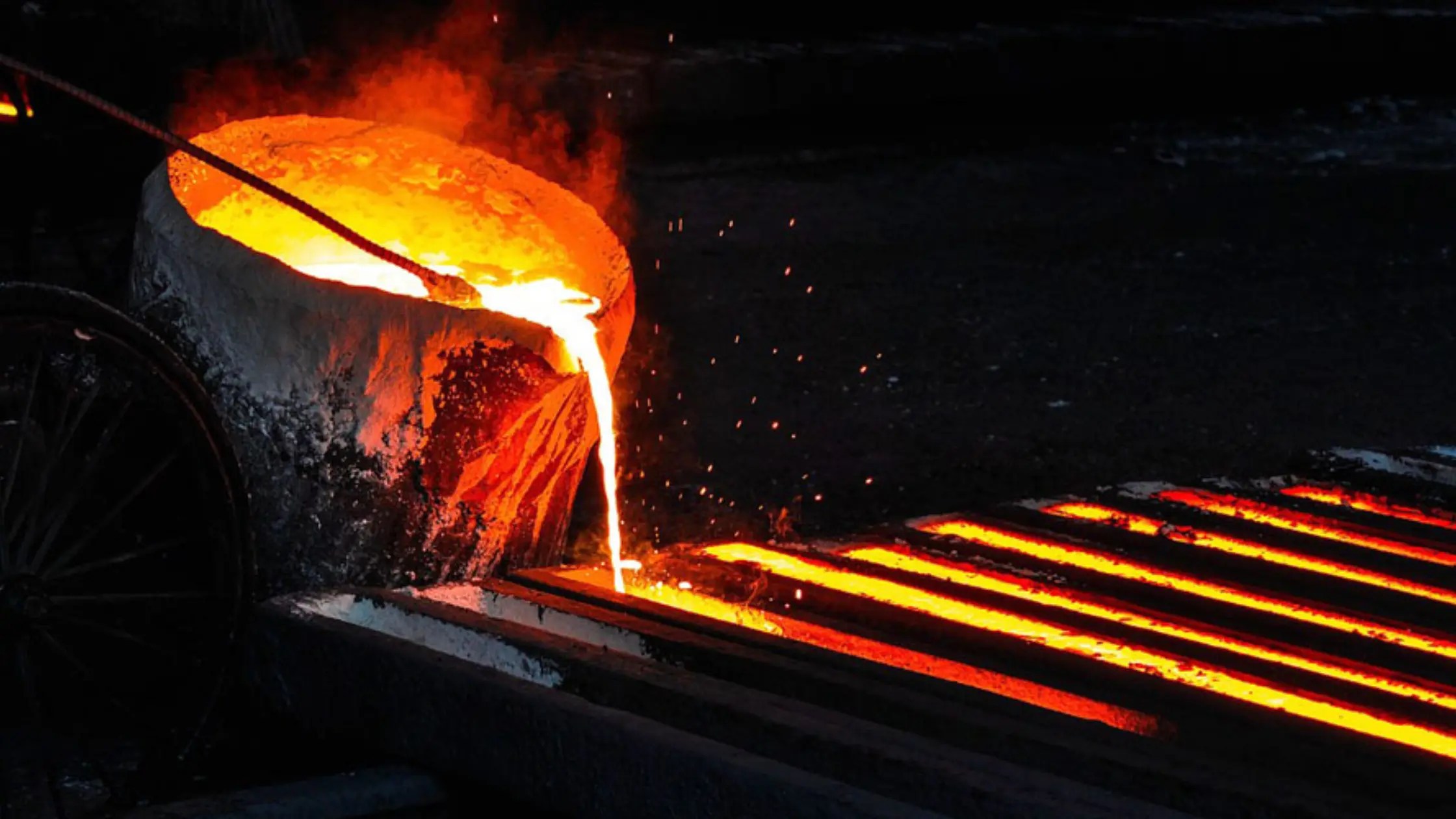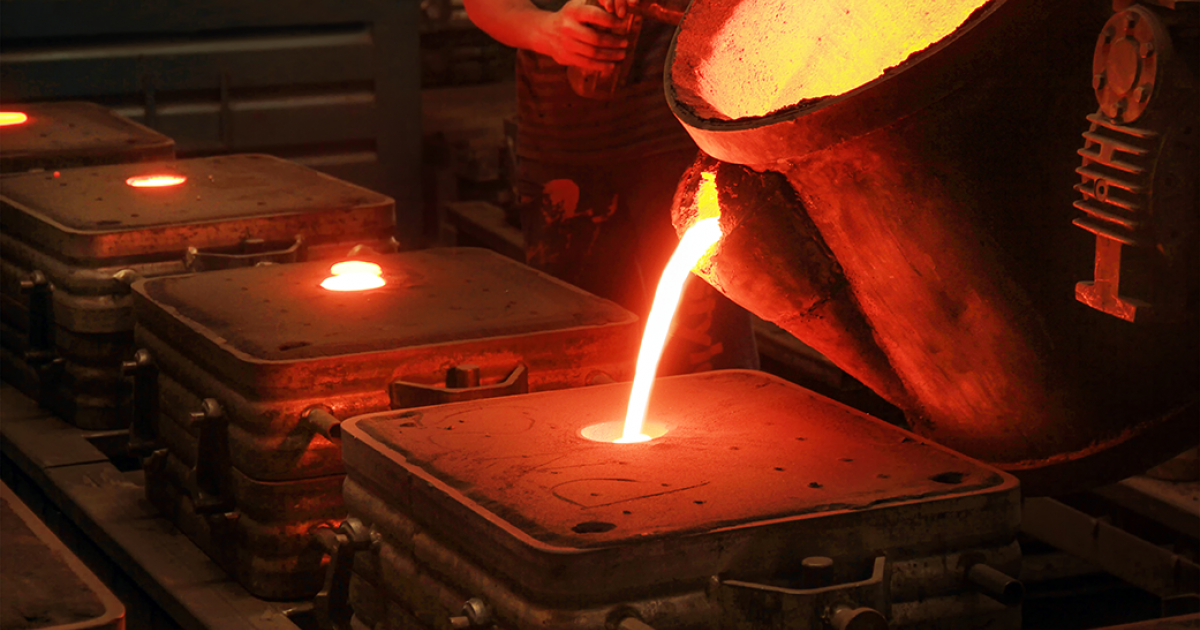A Comprehensive Guide to Metal Casting: Advantages and Solutions Offered by Foundries
Metal casting is a critical procedure in various markets, providing countless advantages through the solutions of factories. These centers transform liquified metal into resilient and exact components, providing to particular customer needs. By employing sophisticated technologies, factories assure quality and effectiveness in manufacturing. The ins and outs of metal casting and the varied techniques entailed raise essential inquiries about its function in modern-day production. What developments exist ahead in this essential area?
Understanding the Metal Casting Process
The metal casting process is an essential technique used in manufacturing to produce complex forms and parts. This technique includes putting molten metal right into a mold and mildew made to create the preferred item. The process starts with pattern development, which functions as a template for the mold. Aluminum Foundry. Numerous materials, such as sand, metal, or ceramic, are made use of for mold-making, depending on the certain needs of the casting
When the mold is prepared, molten metal is poured into it and enabled to solidify and cool down. After solidification, the mold and mildew is gotten rid of, disclosing the cast part. Numerous techniques, consisting of sand casting, financial investment casting, and pass away casting, are used, each fit to different applications and materials. Quality assurance actions, such as inspections and screening, are necessary to ensure the final item meets requirements. Generally, the metal casting process plays a vital function in producing components for industries varying from vehicle to aerospace.
Key Conveniences of Metal Casting
Metal casting uses significant advantages that make it a recommended production technique in various sectors. Its layout flexibility and precision enable detailed forms, while cost-effective automation boosts efficiency. Furthermore, the adaptability and toughness of materials made use of in casting add to the durability of the last products.
Design Adaptability and Precision
Launching exceptional design versatility and accuracy, metal casting permits designers and developers to develop complex shapes and features that would certainly be impossible or challenging to achieve with various other making techniques. This capability makes it possible for the production of complicated geometries, internal frameworks, and great information that improve item capability and visual appeals. Furthermore, different casting methods, such as sand casting, financial investment casting, and pass away casting, supply additional choices for modification, suiting varied product properties and project requirements. The adaptability of mold and mildews allows alterations throughout the style phase, improving the shift from concept to end product. Ultimately, metal casting stands apart for its capability to provide high-precision components, making it an indispensable procedure in markets ranging from automotive to aerospace and past.
Cost-efficient Automation
Economical automation stands as one of the main benefits of metal casting, making it possible for producers to produce large amounts of elements at a lower expense per system. This effectiveness arises from the ability to develop complex molds that can be reused several times, significantly decreasing setup and operational prices. In addition, metal casting procedures, such as sand casting and die casting, enable for high throughput, making it practical to satisfy the demands of large-scale production runs. The minimized material waste and energy consumption better enhance cost savings, making metal casting an appealing option for markets requiring bulk components. On the whole, the cost-efficient nature of metal casting placements it as a favored method for suppliers intending for economic performance in their manufacturing processes.
Material Convenience and Toughness
One of the standout qualities of metal casting is its remarkable product flexibility, which allows for using a variety of steels and alloys. This adaptability makes it possible for makers to select materials that ideal fit their particular applications, from aluminum and bronze to iron and steel. Each metal offers one-of-a-kind residential or commercial properties, including differing levels of toughness, corrosion resistance, and thermal conductivity. Metal casting can generate parts that fulfill strict efficiency needs throughout diverse markets, such as automobile, aerospace, and building and construction. Additionally, the stamina of actors steels can be enhanced through different therapy procedures, making certain sturdiness and long life. Aluminum Foundry. On the whole, the combination of material flexibility and intrinsic toughness makes metal casting a recommended selection for generating high-quality elements
Types of Metal Casting Methods
Metal casting includes a range of strategies that satisfy various production demands and product homes. Typical approaches consist of sand casting, which makes use of a sand mold and mildew for intricate forms, and financial investment casting, recognized for its accuracy and surface area finish. Die casting is an additional strategy that employs high-pressure injection of molten metal into molds, suitable for mass manufacturing of small parts.
Covering molding uses a much faster alternate, making use of a resin-coated sand to produce thin-walled molds, while shed foam casting permits detailed layouts without the demand for a core.
Furthermore, continual casting is used for creating long areas of metal, such as sheets or bars, by strengthening liquified metal in a continuous process. Each method offers one-of-a-kind benefits and is chosen based upon elements like the required information, manufacturing quantity, and product type, making sure exceptional results in metal construction throughout numerous markets.
The Duty of Foundries in Metal Casting
Shops play an essential duty in check here the metal casting procedure, working as the centers where molten metal is changed into finished items. These specialized establishments are geared up with the needed tools and technologies to take care of numerous steels, making sure top quality outcomes. Foundries are accountable for several vital features, consisting of melting the metal, pouring it right into mold and mildews, and enabling it to solidify.
Additionally, they maintain rigorous safety and environmental standards to secure employees and reduce eco-friendly effect. Skilled technicians and designers collaborate to enhance casting procedures, enhancing effectiveness and lowering waste. Foundries likewise participate in quality control procedures, making certain that the last products satisfy details tolerances and specs. This top quality guarantee is vital for sectors that rely upon specific components, such as auto and aerospace. Consequently, foundries add substantially to the total production landscape, making it possible for technology and development throughout numerous markets.
Custom Metal Casting Providers
Custom metal casting services provide customized design options that meet details client demands. These solutions additionally give product selection proficiency, making certain the right metal is selected for the preferred application. Such versatility and understanding boost the general high quality and performance of the end product.

Customized Style Solutions
Customized style solutions in metal casting supply producers with the adaptability to produce parts that meet details performance and visual demands. Foundries supply personalized solutions that enable customers to specify measurements, forms, and surface area coatings to attain preferred end results. This personalization process often includes collaboration in between engineers and developers, guaranteeing that the last products straighten with operational needs and market standards. Advanced innovations, such as computer-aided style (CAD) and simulation software application, allow accurate modeling and testing of components before manufacturing, minimizing mistakes and improving effectiveness. By leveraging tailored style remedies, services can optimize capability while minimizing waste and expenses, ultimately bring about a much more one-upmanship out there. This versatility is essential for markets requiring special applications and specifications.
Product Selection Experience
When selecting materials for metal casting, competence plays a crucial function in ensuring that the appropriate selection lines up with both efficiency requirements and cost-effectiveness. Foundries utilize proficient experts that recognize the buildings of different metals and alloys, permitting them to suggest optimal materials for particular applications. Elements such as strength, corrosion resistance, and thermal conductivity are meticulously thought about to satisfy the client's demands. Additionally, sector patterns and developments in material scientific research inform these choices, enabling foundries to remain affordable. By leveraging their know-how, shops can aid clients in steering with complicated material choices, eventually causing enhanced product quality and lowered manufacturing expenses. This specialized expertise is essential for achieving effective outcomes in customized metal casting solutions.
High Quality Control in Metal Casting
Quality assurance in metal casting is vital to guarantee that the end products fulfill the required specifications and efficiency requirements. Shops utilize a selection of approaches and techniques to guarantee the highest possible high quality of actors elements. This procedure begins with rigid material assessments, confirming that raw materials adhere to industry criteria. Throughout the casting process, real-time surveillance and testing are performed to assess specifications such as temperature, mold and mildew stability, and dimensional precision.

Applications of Metal Castings Throughout Industries
Metal spreadings play an important duty in numerous sectors, acting as the foundation for countless applications. In the vehicle market, cast elements such as engine blocks and transmission real estates are essential for lorry performance and reliability. The aerospace industry relies upon accuracy castings for vital parts that ensure safety and security and effectiveness in trip. Furthermore, the building and construction market makes use of metal castings for components, fittings, and structural components, enhancing the durability of structures and framework.
The energy market advantages from spreadings used in generator blades and other equipment crucial for power generation. The medical area additionally utilizes metal castings in gadgets and tools, showing the convenience of this manufacturing procedure. In general, metal spreadings are indispensable to the functionality and development of varied fields, showcasing their importance in contemporary innovation and infrastructure advancement
Often Asked Inquiries
What Materials Are Typically Made Use Of in Metal Casting?
Common materials used in metal casting include light weight aluminum, iron, brass, steel, and bronze. Each material provides special homes appropriate for numerous applications, permitting manufacturers to select the best choice based upon deterioration, strength, and weight resistance.
For how long Does the Metal Casting Refine Usually Take?
The metal casting process generally takes numerous hours to a couple of days, depending on elements such as the complexity of the design, sort of metal used, and the particular casting method used by the foundry.
What Is the Ecological Effect of Metal Casting?
The environmental effect of metal casting consists of energy usage, emissions, and waste generation. Shops commonly execute measures to alleviate these effects, such as reusing products and making use of cleaner innovations to lower their ecological impact.
Can Metal Casting Be Provided For Small-Scale Projects?
Metal casting can undoubtedly be executed for small-scale jobs. Numerous foundries deal with such demands, using personalized solutions that suit restricted production runs while maintaining quality and accuracy in the end products.
What Are the Safety And Security Procedures in Metal Casting Foundries?
In metal casting factories, security measures include individual protective devices, appropriate air flow, training on tools usage, emergency situation treatments, regular upkeep checks, and adherence to market safety and security criteria to minimize risks connected with molten metal and unsafe materials.
In addition, metal casting procedures, such as sand casting and die casting, permit for high throughput, making it possible to fulfill the demands of massive manufacturing runs. One of the standout qualities of metal casting is its remarkable material convenience, which allows for the use of a wide variety of alloys and steels. Additionally, constant casting is made use of for generating long sections of metal, such as bars or sheets, by strengthening molten metal in a continuous process. Factories play a crucial role in the metal casting process, serving as the facilities where molten metal is changed right into finished products. Typical products made use of in metal casting include aluminum, iron, steel, brass, and bronze.